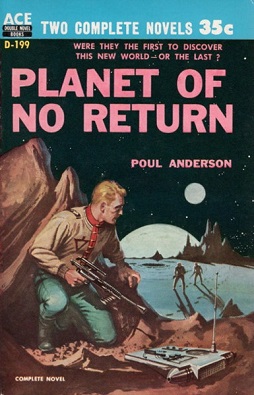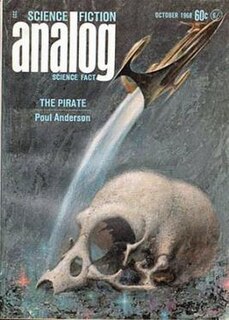Related Research Articles

Alternate history is a genre of speculative fiction of stories in which one or more historical events occur and are resolved differently than in real life. As conjecture based upon historical fact, alternative history stories propose What if? scenarios about crucial events in human history, and present outcomes very different from the historical record. Alternate history also is a subgenre of literary fiction, science fiction, and historical fiction; as literature, alternate history uses the tropes of the genre to answer the What if? speculations of the story.
A future history is a postulated history of the future and is used by authors of science fiction and other speculative fiction to construct a common background for fiction. Sometimes the author publishes a timeline of events in the history, while other times the reader can reconstruct the order of the stories from information provided therein.

The Foundation series is a science fiction book series written by American author Isaac Asimov. First published as a series of short stories in 1942–50, and subsequently in three collections in 1951–53, for thirty years the series was a trilogy: Foundation, Foundation and Empire and Second Foundation. It won the one-time Hugo Award for "Best All-Time Series" in 1966. Asimov began adding new volumes in 1981, with two sequels: Foundation's Edge and Foundation and Earth, and two prequels: Prelude to Foundation and Forward the Foundation. The additions made reference to events in Asimov's Robot and Empire series, indicating that they also were set in the same fictional universe.

Chalkidiki also spelled Chalkidike, Chalcidice, Khalkidhiki, or Halkidiki, is a peninsula and regional unit of Greece, part of the region of Central Macedonia, in the geographic region of Macedonia in Northern Greece. The autonomous Mount Athos region constitutes the easternmost part of the peninsula, but not of the regional unit.
The Populares were a political faction in the late Roman Republic who favoured the cause of the plebeians.

The Shape of Things to Come is a work of science fiction by British writer H. G. Wells, published in 1933. It takes the form of a future history which ends in 2106.

Question and Answer is a science fiction novel by American writer Poul Anderson. It originally appeared in the June and July 1954 issues of magazine Astounding Science Fiction, and was later reprinted in 1956 as part of Ace Double D-199 under the title Planet of No Return, and again as a stand-alone Ace novel in February 1978 under the original title.

The Psychotechnic League is a future history created by American science fiction writer Poul Anderson. The name "Psychotechnic League" was coined by Sandra Miesel in the early 1980s, to capitalize on Anderson's better-known Polesotechnic League future history. Anderson published 21 novels, novellas and short stories set in this future between 1949 and 1957, with a 22nd published in 1968.

"The Pirate" is a science fiction short story by American writer Poul Anderson that first appeared in the October 1968 issue of Analog. "The Pirate" was a prequel to the earlier Psychotechnic League novel Star Ways, and was the last story in the Psychotechnic series to be published. The story was included in the 1975 collection Homeward and Beyond and the 1982 collection Starship, and the timeline from the latter collection places the story in the year 3115.

"Un-Man" is a science fiction novella by American writer Poul Anderson, first published in the January 1953 issue of Astounding Science Fiction. It was included in the 1962 collection Un-Man and Other Novellas, and the 1981 collection The Psychotechnic League. As a component of the Psychotechnic League future history, "Un-Man" takes place in the year 2004, between "Marius" and "The Sensitive Man".

Macedonian nationalism is a general grouping of nationalist ideas and concepts among ethnic Macedonians that were first formed in the late 19th century among separatists seeking the autonomy of the region of Macedonia from the Ottoman Empire. The idea evolved during the early 20th century alongside the first expressions of ethnic nationalism among the Slavs of Macedonia. The separate Macedonian nation gained recognition after World War II when the "Socialist Republic of Macedonia" was created as part of Yugoslavia. Afterwards the Macedonian historiography has established historical links between the ethnic Macedonians and events and Bulgarian figures from the Middle Ages up to the 20th century. Following the independence of the Republic of Macedonia in the late 20th century, issues of Macedonian national identity have become contested by the country's neighbours, as some adherents to aggressive Macedonian nationalism, called Macedonism, hold more extreme beliefs such as an unbroken continuity between ancient Macedonians, and modern ethnic Macedonians, and views connected to the irredentist concept of a United Macedonia, which involves territorial claims on a large portion of Greece, along with smaller regions of Albania, Bulgaria, Kosovo and Serbia.

Emmanouel Pappas was a prominent member of Filiki Eteria and leader of the Greek War of Independence in Macedonia.
The National Liberation Front, also known as the People's Liberation Front, was a communist political and military organization created by the Slavic Macedonian minority in Greece. The organization operated from 1945–1949, most prominently in the Greek Civil War. As far as its ruling cadres were concerned its participation in the Greek Civil War was nationalist rather than communist, with the goal of secession from Greece.

Macedonians, also known as Greek Macedonians or Macedonian Greeks, are a regional and historical population group of ethnic Greeks, inhabiting or originating from the Greek region of Macedonia, in Northern Greece. Today, most Macedonians live in or around the regional capital city of Thessaloniki and other cities and towns in Macedonia (Greece), while many have spread across Greece and in the diaspora.

"The Sensitive Man" is a science fiction novella by American writer Poul Anderson, first published in the January 1954 issue of Fantastic Universe and reprinted in the 1981 collection The Psychotechnic League. The story is a component of the Psychotechnic League future history, and takes place in the year 2009, between "Un-Man" and "The Big Rain".

Metaxism is an authoritarian nationalist ideology associated with Greek dictator Ioannis Metaxas. It called for the regeneration of the Greek nation and the establishment of a modern, culturally homogenous Greece. Metaxism disparaged liberalism, and held individual interests to be subordinate to those of the nation, seeking to mobilize the Greek people as a disciplined mass in service to the creation of a "new Greece."

"Brake" is a science fiction short story by American writer Poul Anderson, first published in 1957 in Astounding Science Fiction and reprinted in the collections Beyond the Beyond (1969) and The Psychotechnic League (1981). As a component of the Psychotechnic League future history / alternate history, "Brake" takes place in 2270, as the civilization built up in the aftermath of the 1958 Third World War is being torn between mutually antagonistic factions, on the verge of collapsing into "the day of genocide and the night of ignorance and tyranny".

Emmanouil Pappas is a village in the Serres regional unit, Greece. Since the 2011 local government reform, it has been part of the municipality of Emmanouil Pappas. It is situated in the foothills of mountain Menoikio, 17 km east of Serres, and 101 km northeast of Thessaloniki. The former name of the village was Dovista. It was renamed Emmanouil Pappas in 1927, after the hero of the Greek War of Independence in Macedonia who was born there in 1773.

Julius Caesar's planned invasion of the Parthian Empire was to begin in 44 BC, but the Roman dictator's assassination that year prevented the invasion from taking place.
References
- ↑ Seed, David (2013-10-31). American Science Fiction and the Cold War: Literature and Film. Routledge. pp. 41–42. ISBN 978-1-135-95389-8.